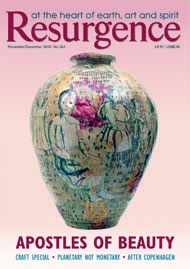Sufficiency, sustainability and security are key needs of people and all living systems. We also need maximum citizen participation, diversity, resilience and whole-system health. Untrammelled economic growth did not foster these features in the past; nor can it do so in the future.
In the drive for economic growth – at all costs and forever – we brought monetary wealth to a few. At the same time, we destroyed ecosystems and created huge social injustices. The culture surrounding growth also encouraged many of our worst human capacities –indifference, cruelty, denial, cynicism, a narrow materialism and short-term thinking – in an effort to compete with others.
Even if it were desirable to have that kind of growth, it is unlikely that we can, given that we are near the end of cheap oil and facing imminent crises over water and huge challenges of climate change. Therefore the philosophy of ‘enough’ provides a sane basis for moving into a sustainable and fulfilling future.
Enough is a concept that is intrinsically ecological, moral and aesthetic. Enough helps us cope with the world as it is. If we apply ‘enough’ to our health, finances and personal energy, we automatically restrict the kinds of damage we might be unwittingly doing in the wider world.
A sense of ‘enough’ can nourish a culture of adapted human behaviour, which will give at least some of the Earth’s ecosystems a chance for renewal and at the same time foster social justice. Enough also has important reflective and qualitative aspects which will underpin some practical proposals for a transition to a more ecologically sound and stable world, including a citizen’s income and individual carbon quotas.
In order to build a future of sufficiency and ‘enoughness’, we need to develop four essential qualities of coping, critiquing, resisting and creating. There is a sense of urgency about all that needs to be done, but overnight revolution and instant change are not possible. We have to cope or survive in the present as well as critiquing and resisting what is wrong.
We need spiritual and intellectual courage for these activities, as well as persistence and patience, in uncertain circumstances over a prolonged period. To engage simultaneously in coping, critiquing, resisting and creating may seem impossible, because they involve engagement with what is, at the same time as we try to change it. But by attending always to these four ‘ingredients’, we will ensure that the means and the ends are complementary.
In addition, each ‘ingredient’ affects our personal and social lives at the same time. They are ways of thinking that can simultaneously permeate all we do. The personal and the social cannot be cut off from each other. The path of enough is integrative: it promotes progressive personal change and progressive social change, understanding them as dependent upon each other and requiring equal attention.
Enough is about possibility, which is different from prediction and expectation. The future is not knowable, but possibility remains open to us; we know that when large numbers of people, working and communicating with each other, develop in their daily lives new ways of formulating problems and responses to those problems, social change takes place and it can influence decision-making at the highest levels.
A better world is possible only if greater numbers of people ask hard questions such as “How much is too much?” “Who decides?” and “Who wins or loses in the process?” Ecologists, philosophers, educators, business leaders, politicised religious leaders, scientists and ordinary citizens need to come together to promote ‘enough’ and those new visions surrounding it.
Enough is neither cynical nor utopian, but it is hopeful. It is based on our potential for good; it is simple but not simplistic, a principled way of understanding and being. We can think about the future in a hopeful way, grounded in the belief that humans can live up to their potential for good and for ethical action. The problems facing us are very serious, but if we look only at the extremely hard realities and avoid the language of possibility, then the realities can seem overwhelming, and we slip into cynicism, denial or despair. We need to lay claim to the notion that human beings have the capacity to influence and shape the forces that structure our lives.
Efforts for change are most successful when people work together and have a sense of connectedness. Solidarity can amplify the voice of the movement of ‘enough’; and when your voice has a better chance of being heard, your hope is maintained. We need a worldview of ‘enough’ which combines a quest for coherence, wholeness and connections, with fluidity and flexibility.
As a global species, we humans still have one foot on a path where asking the question “What is enough?” is seen as naive, idealistic, or even heretical in the face of the ‘gods of money’ and unregulated economic growth. But the other foot is already on a path where people are working to establish enough. This path is a little faint but nonetheless recognisable. Many people know that it can lead us to a future of elegant, sustainable sufficiency, security and wellbeing for all, rather than poverty for some and short-term affluence for others. Let us take on the task of making the path of enough the well-trodden one.







